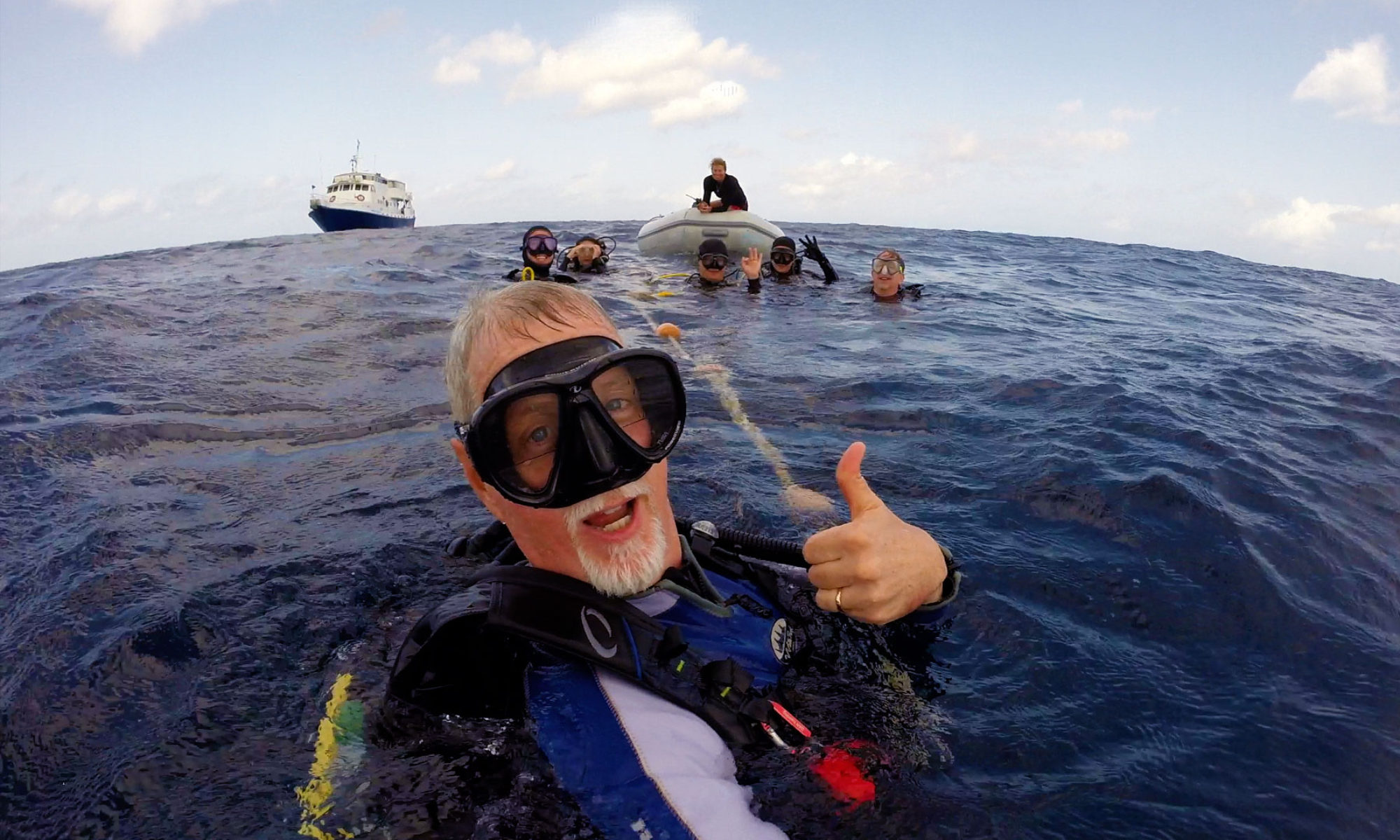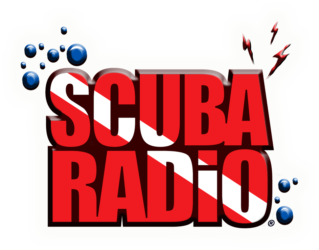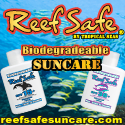Dive industry comes together to spotlight solution to 6-pack ring of death!
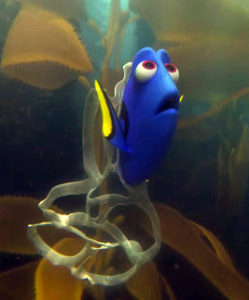 Tuesday June 28 at 5pm members of the diving community came together at Saltwater Brewery in Delray Beach, Florida.
Tuesday June 28 at 5pm members of the diving community came together at Saltwater Brewery in Delray Beach, Florida.
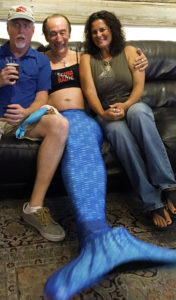 The celebration was an attempt to show support and draw attention to a unique new process this small Florida brewery has created that replaces the 6-pack ring of death with an edible and biodegradable alternative. (See the video here)
The celebration was an attempt to show support and draw attention to a unique new process this small Florida brewery has created that replaces the 6-pack ring of death with an edible and biodegradable alternative. (See the video here)
As divers, we are all to aware of how plastics effect the environment and marine life we love to see. Spotlighting this creative solution may encourage other companies to adopt the process and potentially eliminate a problem that has plagued our oceans and waterways for years.
Many dive industry celebs like Neal Watson, Peter Hughes, and Captain Slate were on hand for the event and to record the July 9th edition of ScubaRadio….or what evolved into “Beer” Radio. 😉
Listen, learn, and spread the word!
HOUR1
HOUR2
Top 10 reasons to use REEF SAFE SUNCARE
Sunscreen Scientifically Proven Safe for Both the Environment and Skin
Ormond Beach, FL (March 29, 2016) Beach season is quickly approaching, and it’s time to start thinking about using sunscreen. “Think Blue – it's the new green” this Spring Break and summer by choosing Reef Safe SunCare, a sunscreen that not only protects skin from the sun, but has been scientifically proven harmless to our ocean environment.
“There are so many reasons why people should wear sunscreen, but too many of us are applying sunscreens to our bodies that could be dangerous to our ocean and marine life,” commented Dan Knorr CEO/President of Tropical Seas. “This is why Reef Safe’s main mission is to produce environmentally friendly products that will keep the ocean clean, thereby creating a safe haven for ocean inhabitants. Reef Safe has been scientifically proven to biodegrade in oceans, lakes and rivers; thus protecting fragile ecosystems while protecting your skin. Whether it’s spending the day scuba diving, snorkeling, boating or relaxing at the beach, Reef Safe SunCare is the best sunscreen to use while having fun in the sun.”
Here are 10 reasons why Reef Safe SunCare should be every outdoor enthusiast's choice of sunscreen:
1. Proven Non-Toxic to Tested Corals: Reef Safe engaged the world renowned Mote Marine Tropical Research Laboratory to test the toxicity of Reef Safe’s formulations, containing varying levels of sunscreen actives, including oxybenzone, on corals representatives of both inshore and offshore habitats. Research findings concluded that Reef Safe formulas caused no visual signs of stress, bleaching or mortality to tested corals at any level of sunscreen treatments over periods of 24 hours, 96 hours and 20 days.
2. Biodegrades in oceans, lakes and rivers: Research has shown that Reef Safe SunCare products biodegrade, on average, in less than 90 days in seawater and freshwater. Tests have also found that Reef Safe’s water resistant 80 minute formula allows less than three percent of the product to come off in the water.
3. Lightweight protection: There’s nothing worse than applying sunscreen that leaves your skin feeling greasy and ghostly white. Reef Safe SunCare applies sheer and smooth, absorbs quickly leaving an invisible, breathable film on your skin.
4. Water Resistant: Those concerned about getting sunburnt while spending most of the day in the water don't need to worry! Reef Safe SunCare is water resistant for up to 80 minutes, making it the perfect choice for people participating in outdoor and water sports activities. Take a Reef Safe “Time Out” to reapply every two hours to ensure proper sunburn protection.
5. Sensitive Skin Sunscreen: Reef Safe SunCare is a great solution for sunscreen users who have sensitive skin. Reef Safe’s products are unscented and specifically formulated with a custom botanical blend that contains Aloe Vera & Algae Extract to help soothe and rehydrate sensitive skin.
6. Fish-friendly: Reef Safe’s sunscreens have shown no evidence of toxicity to microorganisms or other marine life, so both endangered and common sea creatures alike remain unharmed by these products. Reef Safe will also not contaminate or kill fishermen’s bait.
7. Stain-free on clothes and furniture: While many sunscreens rub off on clothing, linens and furniture causing discoloration and unsightly stains, Reef Safe products are specially formulated to keep clothing, linens and furniture just as safe and protected as skin.
8. Effective and affordable: Whether buying one bottle or purchasing in bulk, Reef Safe helps keep the green in your wallet along with protecting your skin and the environment. Reef Safe SunCare typically retails from $5.00 / 4 oz to $13.00/ 8 oz pending the SPF value.
9. Eco-friendly packaging: Reef Safe sunscreen formulas are not only safe for our ocean, their packaging is also eco-friendly. All products are packaged in 100% Plant derived bio-resin bottles, which use 90% less energy, thereby leaving a negative carbon footprint.
10. Exceeds all FDA standards: All ingredients used in Reef Safe products are FDA approved for use in sunscreens and are manufactured in their FDA-registered factory. After products are manufactured, they are sent out for testing to ensure that they conform to all FDA standards.
About Reef Safe SunCare
Reef Safe SunCare, was introduced in 1996 by Tropical Seas of Ormond Beach, FL, as a sunscreen scientifically proven to biodegrade in oceans, lakes and rivers; thus protecting fragile ecosystems while protecting skin. Reef Safe sunscreen formulas were subjected to a comprehensive series of independent laboratory tests to support and authenticate safe for coral, non-toxic to sea life as well as the biodegradability of the lotions. Research found that Reef Safe SunCare products biodegrade, on average, in less than 90 days in seawater and freshwater. No evidence of toxicity to microorganisms or other sea life was detected. Research also found that Reef Safe’s water resistant formula allows less than three percent of the product to come off after 80 minutes of activity in water. At Reef Safe it's not just about the ingredients – It's about how those ingredients are processed.
Reef Safe SunCare is also available through dive distributors Trident Dive, Marine Sports Manufacturing and A-Plus Marine.
REEF SAFE™ SUNCARE PROVEN NON-TOXIC TO TESTED CORALS
Ormond Beach, FL (March 2, 2016) To determine the impact of its sun care products on coral reefs, Reef Safe engaged the world-renowned Mote Marine Tropical Research Laboratory to test the toxicity of Reef Safe's formulations, containing varying levels of sunscreen actives including oxybenzone, on corals representative of inshore and offshore habitats. Research findings concluded Reef Safe formulas showed no visual signs of stress, bleaching or mortality to corals at any level of sunscreen treatment over periods 24 hours, 96 hours and 20 days.
“Coral Reefs have been subjected to damage over the past decades, and one of the supposed contributing factors is the effect that sunscreen chemicals have on the health of corals,” commented Dan Knorr, President and C.E.O of Tropical Seas. “This test was designed to simulate conditions found at coral reef sites impacted by large volumes of swimmers, snorkelers and scuba divers, all using Reef Safe formulated sunscreens, which include oxybenzone as one of the active ingredients. However, with Reef Safe, it's not just about the ingredients; it's about how those ingredients are processed. Further testing included simulating snorkel boats with the equivalent of 2,984 snorkelers wearing Reef Safe formulas battering the reef twice a day.”
All testing was conducted in the Mote Marine Tropical Research Laboratory to scientifically substantiate Reef Safe's claim that their sunscreens do not harm corals. For the research, Mote Marine Laboratory tested Reef Safe's SPF 50, SPF 45 and SPF 30 (no oxybenzone) formulas against a control setting with no product. Hard corals tested were representative of inshore and offshore habitats. Each of the coral fragments (100 each) were distributed equally between 20 tanks with five of each species in a given 20 liter aquarium. All tanks were placed in the laboratory's temperature controlled raceway and supplied filtered seawater at a temperature of 80.6 degrees Fahrenheit under natural light conditions. Before starting the test, each fragment was visually inspected to evaluate the health of the corals, to be compared up to 20 days or the completion of the study. All corals were visually assessed using a coral health code established by the Florida Fish and Wildlife Conservation Commission (FWC).
Each day before the sunscreen was added to the tanks, a condition survey was completed to note each individual coral's health. Corals were ranked on a scale of 1-6 for tissue loss and color; 1 being no live tissue and 6 being no loss of tissue.
The test results revealed at the end of the 20-day study there were no mortalities and no significant difference (.050) observed at any level of exposure of test fragments relative to controls, therefore proving the safety of Reef Safe SunCare products on these corals.
Reef Safe SunCare, was introduced in 1996 by Tropical Seas of Ormond Beach, FL, as a sunscreen scientifically proven to biodegrade in oceans, lakes and rivers; thus protecting fragile ecosystems while protecting skin. Reef Safe sunscreens were subjected to a comprehensive series of independent laboratory tests to support and authenticate the biodegradability of the lotions. The research found that Reef Safe SunCare products biodegrade, on average, less than 90 days in seawater and freshwater. No evidence of toxicity to microorganisms or other sea life was detected. Research also found that Reef Safe's waterproof for
Ormond Beach, FL (March 2, 2016) To determine the impact of its sun care products on coral reefs, Reef Safe engaged the world-renowned Mote Marine Tropical Research Laboratory to test the toxicity of Reef Safe's formulations, containing varying levels of sunscreen actives including oxybenzone, on corals representative of inshore and offshore habitats. Research findings concluded Reef Safe formulas showed no visual signs of stress, bleaching or mortality to corals at any level of sunscreen treatment over periods 24 hours, 96 hours and 20 days.
“Coral Reefs have been subjected to damage over the past decades, and one of the supposed contributing factors is the effect that sunscreen chemicals have on the health of corals,” commented Dan Knorr, President and C.E.O of Tropical Seas. “This test was designed to simulate conditions found at coral reef sites impacted by large volumes of swimmers, snorkelers and scuba divers, all using Reef Safe formulated sunscreens, which include oxybenzone as one of the active ingredients. However, with Reef Safe, it's not just about the ingredients; it's about how those ingredients are processed. Further testing included simulating snorkel boats with the equivalent of 2,984 snorkelers wearing Reef Safe formulas battering the reef twice a day.”
All testing was conducted in the Mote Marine Tropical Research Laboratory to scientifically substantiate Reef Safe's claim that their sunscreens do not harm corals. For the research, Mote Marine Laboratory tested Reef Safe's SPF 50, SPF 45 and SPF 30 (no oxybenzone) formulas against a control setting with no product. Hard corals tested were representative of inshore and offshore habitats. Each of the coral fragments (100 each) were distributed equally between 20 tanks with five of each species in a given 20 liter aquarium. All tanks were placed in the laboratory's temperature controlled raceway and supplied filtered seawater at a temperature of 80.6 degrees Fahrenheit under natural light conditions. Before starting the test, each fragment was visually inspected to evaluate the health of the corals, to be compared up to 20 days or the completion of the study. All corals were visually assessed using a coral health code established by the Florida Fish and Wildlife Conservation Commission (FWC).
Each day before the sunscreen was added to the tanks, a condition survey was completed to note each individual coral's health. Corals were ranked on a scale of 1-6 for tissue loss and color; 1 being no live tissue and 6 being no loss of tissue.
The test results revealed at the end of the 20-day study there were no mortalities and no significant difference (.050) observed at any level of exposure of test fragments relative to controls, therefore proving the safety of Reef Safe SunCare products on these corals.
Reef Safe scientifically proven safe to coral and sea life….again!
New Reef Safe packaging uses 90% less energy and creates negative carbon footprint!
Give the gift of SCUBA. :-)
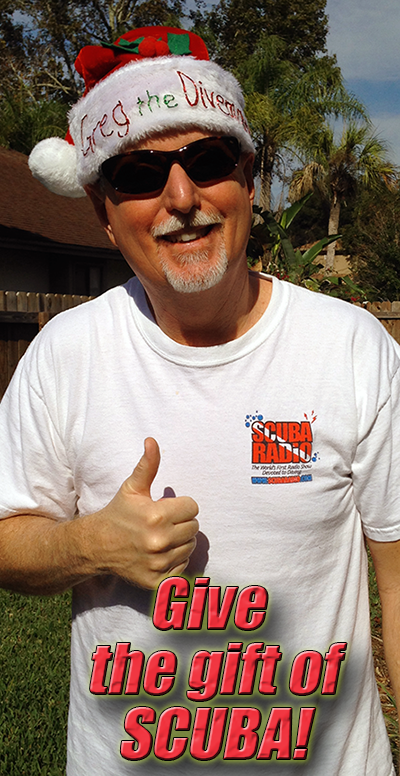 No need to fight those crowds at the mall or worrying about getting the right size and color. Scuba certification lessons are the perfect gift! Just stop by your local dive store and purchase a class. We dive in buddy pairs, so you might as well pick up one for yourself as well and enjoy the gift that will keep on giving for years to come.
No need to fight those crowds at the mall or worrying about getting the right size and color. Scuba certification lessons are the perfect gift! Just stop by your local dive store and purchase a class. We dive in buddy pairs, so you might as well pick up one for yourself as well and enjoy the gift that will keep on giving for years to come.
Already certified?….Consider a speciality class to improve your skills or better yet, a ScubaRadio ScubaCruise!
This friendly reminder brought to you by your dive buddies at ScubaRadio…the world's first radio show devoted to diving! 🙂
Please share and post this on your Facebook/Twitter feeds.
